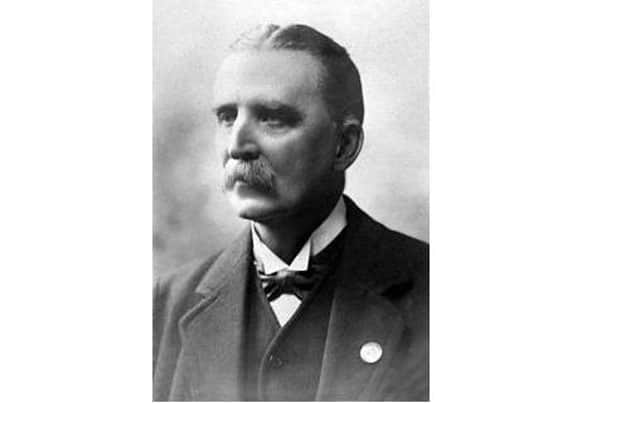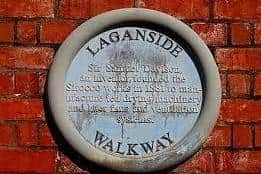Industrialist who ran a tea estate in India, then returned to found Sirocco


They were Unitarians and they lived at Seacourt, Bangor. This year marks both the 175th anniversary of the birth of Samuel Cleland Davidson and the centenary of his death.
Born on 18 November 1846 in Ballymechan, near Holywood, County Down, Samuel Davidson was the youngest child of five sons and three daughters of James Davidson, a farmer with flour-milling interests in Belfast, and Mary Davidson (née Taylor).
Advertisement
Hide AdAdvertisement
Hide AdHe was educated at the Royal Academical Institution, Belfast, and on leaving school at the age of fifteen he entered the office of William Hastings, a Belfast civil engineer, where he remained until 1864.


In that year he took up the post of assistant manager on a tea estate in Cachar, Assam, India, of which his father was part-owner. Subsequently he became manager and sole proprietor. He rapidly appreciated the inadequacy of the primitive methods then employed, and experience, combined with his inventive genius, suggested the adoption of mechanical apparatus for drying the tea leaf at the plantations.
He sold the property in India in 1874 and returned to Ireland where he began to manufacture his patented tea machinery with Combe, Barbour and Combe of Belfast. In 1881 he started his own manufacturing operation, the Sirocco Engineering Works, in Belfast and developed a full range of mechanical appliances for every process employed in the production of tea.
The name ‘Sirocco’ is derived from the hot wind that blows across the North African desert.
Advertisement
Hide AdAdvertisement
Hide AdNot being satisfied with the centrifugal fans then in use, he carried out experiments and launched the well-known ‘Sirocco’ fan. The works, which had started life as a small workshop employing only seven workmen, within a comparatively short space of time employed over 1,000 men in an extensive and well-equipped factory.
One of the largest engineering firms in Ireland, the Sirocco works manufactured and exported equipment for cooling, drying, dust collecting, heating, ventilating, pneumatic conveyance, and mechanical handling, all invented by Davidson himself.
During the Great War the Sirocco works supplied both the Royal Navy and the Merchant Navy. After the scuttling of the German High Seas Fleet at Scapa Flow in 1919, it was discovered that nearly every German ship was equipped with Sirocco fans manufactured before the war.
Davidson was also responsible for the invention of a new process for the manufacture of raw rubber, for which he designed special machines. The sheer range of his inventions, ranging from belt rivets, steam-engines, to tennis poles, etc, reveals the fertility of his mind.
Advertisement
Hide AdAdvertisement
Hide AdAt the time of his death, Davidson was contemplating the manufacture of peat briquettes.
When King George V visited Belfast for the State Opening of the Northern Ireland Parliament in 1921, Samuel Davidson received a knighthood but he was too unwell to attend the investiture. Two months later, he died at his home in Bangor, County Down, on August 18 1921.
Predictably, as an industrialist and a Non-Subscribing Presbyterian, Davidson was a liberal unionist in politics and served as president of the Ulster Reform Club.
As a young man, he had been a noted athlete and is credited with introducing polo to Ireland.
Advertisement
Hide AdAdvertisement
Hide AdIn 1873 he married Clara Coleman, the great-granddaughter of John Ritchie, a member of the Ayrshire family who laid the foundations of Belfast’s shipbuilding industry at the end of the 18th century and the beginning of the 19th century. The Davidsons too had their origins in Ayrshire.
The Davidsons had five children: three daughters and two sons. One daughter died as an infant in India and a son died of meningitis at the age of 18 in 1897.
James, who was born in 1877, was groomed to take over business. He was educated at the Royal Belfast Academical Institution and Campbell College and became the general manager of the Sirocco works. Like his father, he proved to be a very astute businessman. One contemporary observed that he possessed ‘a keen sense of business possibilities’. He travelled the world to promote the firm. For example, he represented the company at the World Fair in St Louis in 1904 and between October 1910 and July 1911 he undertook ‘a round-the-world’ business trip to sell Sirocco machinery, visiting the Indian subcontinent, Singapore, Hong Kong, Japan and the United States.
Like his father, James was an ardent unionist. During the third Home Rule crisis he joined and served in the 1st Battalion North Down Regiment of the UVF.
Advertisement
Hide AdAdvertisement
Hide AdAlthough James enjoyed a life of privilege (which he combined with hard work), he did not shirk what he considered to be his duty. Following the outbreak of the Great War, he secured a commission, was posted to 13th Royal Irish Rifles and was killed in action on the Somme on 1 July 1916.
On 6 July 1916 Samuel Davidson received a letter from Captain Wilfrid Spender informing him of James’ death. Spender wrote: ‘I cannot say much about your loss. I am told that your son fell after gallantry which deserved the Victoria Cross. Though badly wounded he had insisted on carrying on, and was killed when his men had at last persuaded him to consent to letting them carry him back … If I may say so, I value the friendship of your son, and I hope I may be worthy to renew it later in another and better life.’
Samuel Davidson’s health declined markedly after his son’s death.
Frederick George Maguire, who was married to Samuel Davidson’s daughter Clara and already a senior manager in the firm, inherited the leadership role that would have been James’. He died in 1933.
Advertisement
Hide AdAdvertisement
Hide AdIn 1988, the Davidson Group was acquired by the fan and heat exchanger firm James Howden & Co (established in 1854 by the Scottish engineer James Howden) to form Howden Sirocco Limited, now known as Howden UK. The Sirocco Works were vacated and demolished in 2009 as part of the redevelopment of Belfast’s Waterfront.
In February 2020 the Ulster History Circle unveiled a blue plaque commemorating the life of Sir Samuel Davidson in Rosemary Street in Belfast.